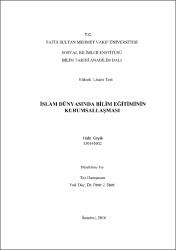| dc.contributor.author | Geyik, Hale | |
| dc.date.accessioned | 2016-06-13T11:51:50Z | |
| dc.date.available | 2016-06-13T11:51:50Z | |
| dc.date.issued | 2016 | |
| dc.date.submitted | 2016 | |
| dc.identifier.citation | GEYİK, Hale, İslam Dünyasında Bilim Eğitiminin Kurumsallaşması, Fatih Sultan Mehmet Vakıf Üniversitesi Sosyal Bilimler Enstitüsü Bilim Tarihi Anabilim Dalı, Yayımlanmamış Yüksek Lisans Tezi, İstanbul 2016 | en_US |
| dc.identifier.uri | https://hdl.handle.net/11352/2333 | |
| dc.description.abstract | Bu tez İslam dünyasında bilim eğitiminin kurumsallaşmaya başlaması zamanına
kadar olan gelişimini ve kurumsallaşma yollarını anlatmayı hedeflemiştir. Bunun için
riyâzî bilimlerin bir başka deyişle matematiksel bilimlerin İslam dünyasındaki XI.
yüzyıla kadar gelişimine odaklanılmıştır. İslam toplumunun sahip olduğu riyâzî bilgi
birikiminin temellerinin anlaşılması için VIII. ile X. yüzyıllardaki dış kaynaklı
bilimlerin İslam dünyasına giriş yolu olan çeviri faaliyetlerinin üzerinde durulmuştur.
Araştırmanın hedefine uygun olarak bilim eğitiminde kurumsallaşmanın izinin
sürülebileceği astronomi, matematik ve tıp bilimlerindeki gelişmeler takip edilmiştir.
Dönem hakkında birincil kaynaklar olarak öne çıkan, İbnü’n Nedîm’in Fihrist ve İbn
Ebî Usaybia’nın Uyunu’l Enbâ adlı eserlerinden faydanılmıştır. Ayrıca medreseler
öncesi eğitim mekanları anlatılmıştır. XI. yüzyıl sonunda medreselerin yaygın
şekilde kurulmaya başlanması ile medreselerin eğitime etkisi sorgulanmıştır. | en_US |
| dc.description.abstract | This thesis aims to give an account of the development and institutionalization of
education in the sciences in the Islamic world until the early period of
institutionalization. In this respect, the writer focuses on the developments in the
mathematical sciences until the XI. century. To understand the roots of the
developments and accumulation of mathematics-based knowledge in Islamic society,
the impact in the VIII to X. centuries of the translation movements, which introduced
sciences from other civilizations, is discussed. Corresponding to aim of the study, the
method of the thesis is to trace the developments in mathematics, astronomy and
medicine which relate to the institutionalization of science education. The Fihrist of
Ibn al-Nadîm and Uyunu’l Enbâ of Ibn Abi Usaybia, which are sources of
considerable importance relating to the time in question, are used as main primary
sources. Also the places of education before madrasas are described. With reference
to the establishment and spreading of the madrasas by the XI. century, the thesis
discusses their influence on education. | en_US |
| dc.language.iso | tur | en_US |
| dc.publisher | Fatih Sultan Mehmet Vakıf Üniversitesi, Sosyal Bilimler Enstitüsü | en_US |
| dc.rights | info:eu-repo/semantics/openAccess | en_US |
| dc.subject | İslam | en_US |
| dc.subject | Bilim | en_US |
| dc.subject | Eğitim | en_US |
| dc.subject | Riyâzî Bilimler | en_US |
| dc.subject | Abbasiler ve Tercüme Hareketi | en_US |
| dc.subject | Medreseler | en_US |
| dc.subject | Science | en_US |
| dc.subject | Education | en_US |
| dc.subject | Islam | en_US |
| dc.subject | Exact Sciences | en_US |
| dc.subject | Translation Movements and the Abbasids | en_US |
| dc.subject | Madrasas | en_US |
| dc.title | İslam Dünyasında Bilim Eğitiminin Kurumsallaşması | en_US |
| dc.type | masterThesis | en_US |
| dc.contributor.department | FSM Vakıf Üniversitesi, Sosyal Bilimler Enstitüsü | en_US |
| dc.relation.publicationcategory | Tez | en_US |
| dc.contributor.institutionauthor | Geyik, Hale | |



















